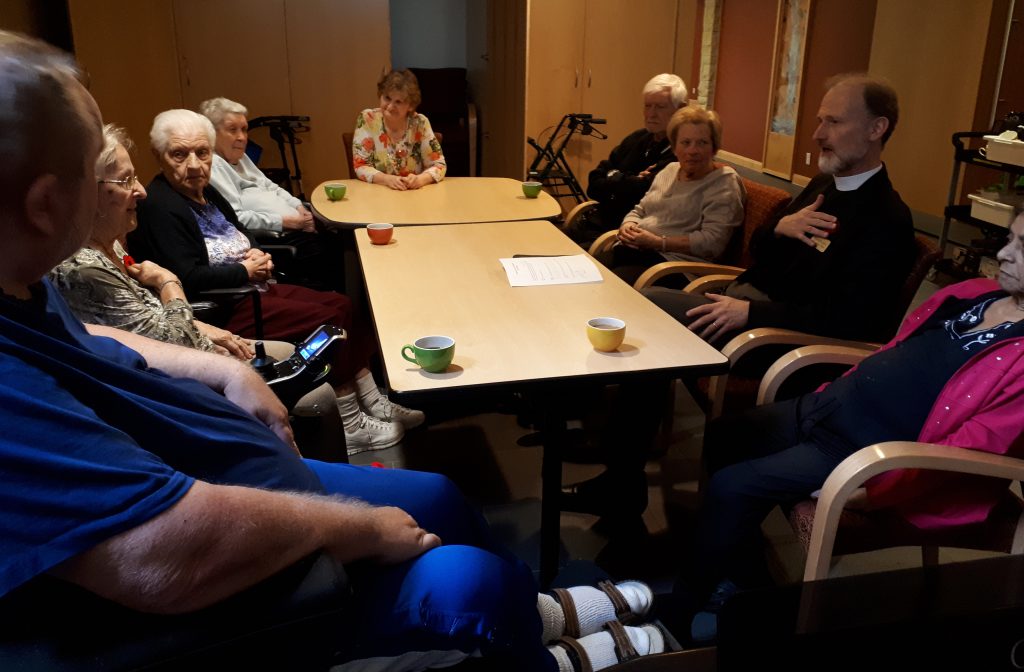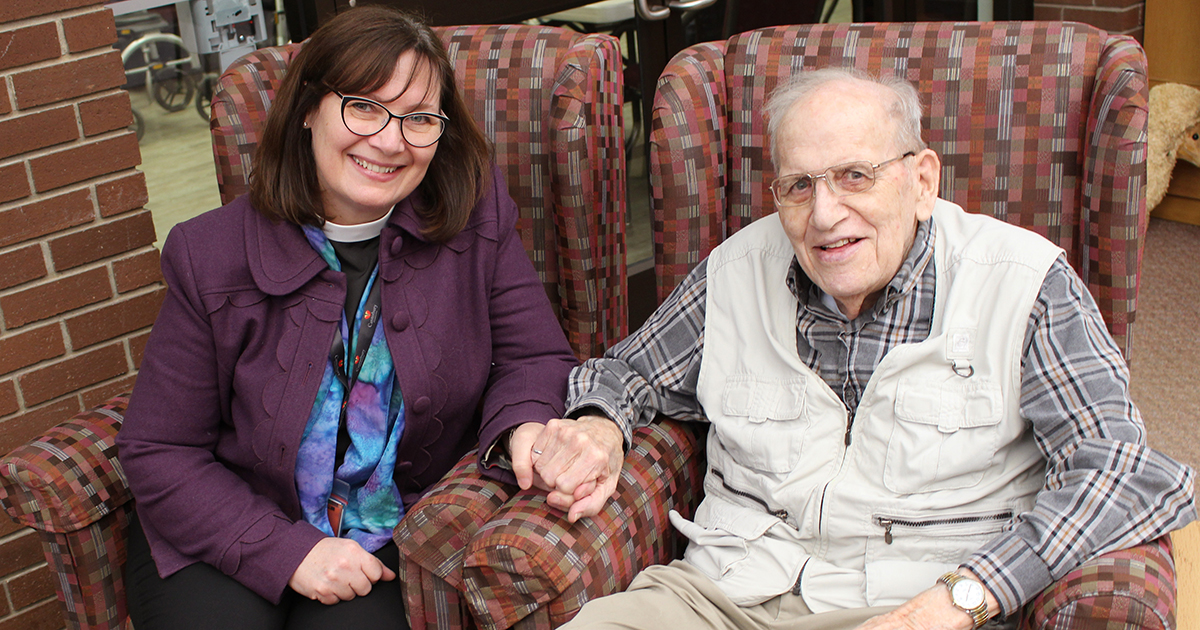Meeting pastoral and spiritual needs of seniors and the elderly can take many forms. It could involve lay people volunteering at hospitals, chatting and spending time with patients. It could also mean providing learning and growth opportunities for those who are retired and seek community.
Sometimes, chaplaincy can take place at seniors’ residences or long-term care homes. Anglican clergy often provide pastoral and palliative care, conduct worship services, and hold Bible study sessions.
Since April, the Rev. Joanne Webster, associate priest at St. Matthias Anglican Church in Edmonton, has served as a part-time chaplain at local seniors’ residence, the Canterbury Foundation. In her time there, she has found that ministry to and with seniors “really makes a difference to [residents’] well-being.”
“We’re good at taking care of physical [ailments] and those kinds of things, but it’s been shown that people often experience spiritual pain as well,” Webster said. “When we’re able to journey with a resident and support their spiritual well-being, it also positively impacts their physical and emotional health as well.”
At the Canterbury Foundation, Webster serves as spiritual care chaplain to all the residents, families and staff. Her ministry includes visiting with residents in their suites and at the hospital, worship services and Bible studies, as well as support and education for staff.
“It is a holistic approach that Canterbury is offering—care for body, mind and soul,” Webster said. “It really brings an increased sense of well-being and security at times where someone may be experiencing loss of hope, loneliness or fear.”
Canterbury Foundation is also embarking on a new palliative care initiative, where residents are able to journey through their last days without moving. Spiritual care, especially during this time helps bring a sense of peace and strength that is appreciated by residents, families and staff.
“When people are experiencing challenges, they often turn to their faith as a means of coping or giving thanks, and I think that’s sort of the essence or grounding of what it means to be human,” she added. “So it’s good to be able to support that when somebody’s wanting to explore it.”
‘How can we bring the light of Christ into people’s lives?’
The Rev. Andreas Thiel, priest and rector at St. Matthew’s Anglican Church in Windsor, Ont., has served since May as a part-time chaplain at Huron Lodge, a long-term care facility owned by the city.

Spiritual care for residents is mandated in Ontario by the Long-Term Care Homes Act. Ordained in 2010, Thiel had always felt called to chaplaincy. When the opportunity to serve as a chaplain at Huron Lodge came up, he wondered how he would balance chaplaincy work with his full-time ministry in the parish.
“We had a conversation with the wardens [and] parish council,” he recalled. “They were on board before I could even finish explaining what this was all about, because they see it as a natural extension of what they do in the community.”
For decades, parishioners at St. Matthew’s have engaged in ministry in schools and at a local detention centre. Thiel views Huron Lodge as another way to take ministry outside the four walls of the church.
“I think it keeps us as a parish community lively and gives us a sense that we’re doing more than just looking after ourselves,” Thiel said. “We’re truly looking around [at] who’s in our neighbourhood, who’s in our community, [and] how can we bring the light of Christ into people’s lives?”
Thiel spends 10 hours each week at Huron Lodge, typically over the course of two afternoons. His main responsibility is pastoral care, ministering directly to the residents and staff. Those who seek his support include people of all faiths and people of no faith.
Once a week, Thiel schedules a regular coffee chat, where residents come out for an hour to sit together and talk about their lives. He also leads a monthly celebration of the Holy Eucharist.
The role of laypersons
Along with ordained chaplains, lay volunteers are another pillar of ministry for the elderly and those in long-term care.
At St. Boniface Hospital in Winnipeg, older patients who have suffered strokes, heart attacks, falls, or other ailments participate in a day program—where physiotherapists and other physicians work to help them get back on their feet, and determine whether or not they are capable of returning home.
For 12 years, Tannis Webster (no relation to Joanne), a retiree and layperson at St. Mary Magdalene Anglican Church in Winnipeg, has volunteered at St. Boniface. As part of the day program, she chats with patients, provides coffee or tea, and plays games such as shuffleboard or bingo.
Webster’s volunteer work began when her son was in the hospital and eventually diagnosed with a rare form of cancer. He eventually had to have extensive surgery, which was only available in Calgary and Halifax.
Choosing the former, which was four hours away from his residence in Fernie, B.C., he spent seven weeks in hospital, during which Webster travelled out from Winnipeg to be with him.
“While I was there, I really realized how difficult it was for hospital patients who are from out of town and have no family around, or any friends or connections in the town,” she said. “I thought how awful that is, because that’s exactly the position my son was in, except that I was there.”
When she returned to Winnipeg afterward, Webster saw an ad in the paper seeking volunteers for the elder life program at St. Boniface. Responsibilities included meeting with people in geriatric wards, sitting, chatting, playing cards, getting them water or hot beverages, and generally helping out.
Though the program was shut down after a couple of years due to lack of funding, Webster’s work during that time set the stage for her current role in the day program.
As Anglicans, she said, “I think we’re called to reach out to people that need assistance … Everybody needs some help sometimes.”
National coordination
Though there is currently no national coordinating body in the Anglican Church of Canada for seniors’ ministry and chaplaincy, that may be about to change. In the course of assisting Faith, Worship, and Ministry (FWM) with development of its liturgical text Prayers for Ministry with the Sick and Dying, a loose network of approximately 40 spiritual care professionals has been established—many of whom are now looking to share resources.
Marking a concrete step in that direction, FWM recently received a grant from the Ministry Investment Fund to host a national gathering of 30-40 Anglican spiritual care providers.
Their national conference is scheduled to take place in June 2019.
Interested in keeping up-to-date on news, opinion, events and resources from the Anglican Church of Canada? Sign up for our email alerts .

